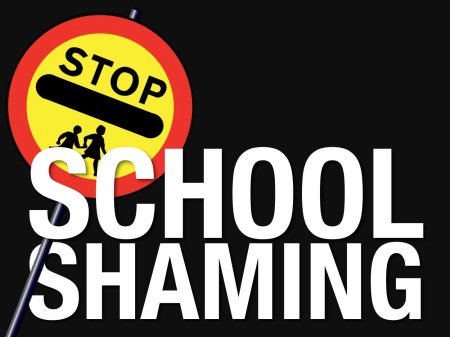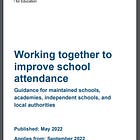School shaming is unfair. Part 2
It's not that all complaints about schools are wrong, it's that public shaming is not the way to address them.
Apologies for the lack of posts recently. This has largely been due to being very busy over Christmas. I will try to catch up now. Paid subscribers should rest assured that if I do not provide a suitable number of paid posts this month, I will extend subscriptions to compensate for the shortfall.
The story so far…
School shaming is where allegations about a school made on social media, or in the conventional media, result in many people publicly denouncing that school.1
In Part 1, I discussed how those who stand up for shamed schools are attacked.
In this post, I will explain in more detail why I oppose school shaming.
The problems with school shaming
When I argue against school shaming, I am not claiming that schools can do no wrong. I do not always believe that the specific allegations in a school shaming story are false. My argument is that public shaming is not a fair process, and is more about denunciation than investigation. What makes school shaming unfair is that:
Schools frequently have no opportunity to respond. There are significant limits to what a school can say about an incident or allegation involving a specific child. It is also not possible to have a reasonable conversation with an online mob. When school leaders try to defend themselves online, or in the press, it usually just leads to further attacks.
Many allegations made about schools are false. Even if an initial complaint was justified, once a school shaming campaign is underway, many false claims will be made. I’ve encountered people online who claim to have inside knowledge of a shamed school’s misdeeds, but cannot answer simple questions about the details of their allegations.2 Also, some school shaming stories in the press are written in the most misleading way possible.3
Many allegations are unreasonable. They can be unreasonable in a number of ways. Often the complaints made during a school shaming refer to policies that almost all secondary schools have. Schools have been shamed for having a compulsory school uniform; restricting when pupils can leave the classroom, and sending staff to visit the homes of absent pupils.4 Sometimes complaints are based on claims that “SEND5 pupils” (a remarkably broad category) can’t be expected to follow any rules, or participate in any school activities that they don’t enjoy. School shamers regularly use bizarre interpretations of the law,6 or language,7 to claim that a school has broken the law. Frequently, allegations about an individual teacher, or a one-off incident, are taken to be representative of an entire school. Sometimes people are, obviously, just looking to pick fault. For instance, one Kent headteacher who was filmed breaking up a fight (calmly and without violence) was criticised extensively.8
School shamers frequently portray themselves as the champions of children, even when their behaviour makes it clear that they are not. Parents who seek publicity are often not acting in their child’s best interests. This is most apparent when schools are attacked for enforcing rules. It’s extraordinary that some parents want their child’s bad behaviour to be reported in the press (typically alongside a picture of their child, and a comment that begins “My Wayne is no angel, but…”). In some stories, schools are accused of humiliating a child, yet whatever embarrassment is being blamed on the school will be magnified by being shared in the media, or over social media. Other stories challenge decisions that were almost certainly made out of compassion and concern for the child’s best interests.9
There are no consequences for those who make malicious accusations. Schools cannot sue for defamation. A pupil cannot be expelled for the behaviour of his or her parents. Teachers’ unions don’t support teachers when their schools are publicly shamed.10 Newspapers don’t tend to retract school-shaming stories that are never substantiated. There is no incentive for school shamers not to do it again and again.
False accusations
The most common feature of school shaming stories is that allegations from pupils or, more often, parents are repeated without independent confirmation. If you’ve ever worked in a secondary school that’s even remotely challenging,11 you know that parents and pupils make many false allegations. Sometimes it’s to get a pupil out of trouble by blaming a teacher; sometimes it’s to pursue a grudge. Teachers can tell you how often they’ve experienced the following:
Things they say are deliberately misinterpreted (e.g. “Did you just say I’m stupid?”12);
The calmest reprimand is described as angry shouting;
Enforcement of the rules, or a sanction in line with school policy, is interpreted as evidence of personal animosity towards a child.13
In part 3, I will discuss how bad journalism makes everything worse.
The easiest way to find my past writing about school shaming is to use this search on my old blog site.
On one occasion, an individual with no direct connection to a school claimed to have read evidence of their draconian rules in a document sent to parents. However, he could not provide any evidence that the document existed, or tell me what the title of the document was. On another occasion, a parent claimed that their secondary school child was banned from the school “playground” for months for a trivial offence. However, they could not give any details at all about how the ban was enforced. Anyone familiar with secondary schools will know that, while it is possible to supervise a pupil at lunchtimes, it is not easy or convenient.
I wrote about a misleading school shaming story here. In this school, pupils carried conduct cards (used to record good and bad behaviour) in their school lanyards. I would assume the lanyards were needed for something else (like a school ID, payment card or key card), but were a convenient place to put the conduct cards. However, by referring to children having to “wear behaviour cards around their necks”, Warwick Mansell managed to convince the Twitter mob that this meant children were walking around with details of their bad behaviour publicly displayed.
I wrote about the last of these here.
Special Educational Needs and Disabilities.
The European Convention on Human Rights and the Equality Act 2010 frequently feature in claims that schools have acted illegally.
Almost anything that a child does not enjoy, particularly punishments for poor behaviour, can be alleged to be harmful. The most extreme school shamers will describe such harm as “child abuse” or “torture”.
Complaints included:
Teachers should have known this incident was going to happen and prevented it;
The headteacher was too calm when he broke up the fight;
Teachers took too long to get to the fight.
This last claim was particularly unfair, as the fight was:
in the street;
several minutes away,
almost certainly not visible from the school building.
Several people falsely claimed that the fight took place outside the school gates.
More than one school has been shamed for providing sandwiches for pupils whose parents have refused to pay for a school meal. Presumably, those responsible didn’t know that it is common for such children to go hungry. Other schools have been shamed in disputes over SEND provision, where all the evidence and common sense would suggest that the school’s approach is appropriate for the child.
Sometimes they join in. Some examples can be found in this blog post.
Or probably any other type of school, I just don’t want to comment about types of school I’m less familiar with.
It’s a struggle not to reply to that with “No, I just thought it”.
In my experience, the more you’ve bent over backwards to go easy on a child and help them do the right thing, the more likely they are to complain that you are being harsh when you do punish them. It’s the child you only remove after the tenth interruption who is most likely to claim that they have done nothing wrong.






